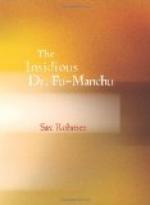Hideous under the pale rays lay the two dead men, their glazed eyes upcast to the peace of the blue heavens. Karamaneh had shot to kill, for both had bullets in their brains. If God ever planned a more complex nature than hers—a nature more tumultuous with conflicting passions, I cannot conceive of it. Yet her beauty was of the sweetest; and in some respects she had the heart of a child—this girl who could shoot so straight.
“We must send the police to-night,” said Smith. “Or the papers—”
“Hurry,” came the girl’s voice commandingly from the darkness of the cottage.
It was a singular situation. My very soul rebelled against it. But what could we do?
“Tell us where we can communicate,” began Smith.
“Hurry. I shall be suspected. Do you want him to kill me!”
We moved away. All was very still now, and the lights glimmered faintly ahead. Not a wisp of cloud brushed the moon’s disk.
“Good-night, Karamaneh,” I whispered softly.
CHAPTER XVIII
To pursue further the adventure on the marshes would be a task at once useless and thankless. In its actual and in its dramatic significance it concluded with our parting from Karamaneh. And in that parting I learned what Shakespeare meant by “Sweet Sorrow.”
There was a world, I learned, upon the confines of which I stood, a world whose very existence hitherto had been unsuspected. Not the least of the mysteries which peeped from the darkness was the mystery of the heart of Karamaneh. I sought to forget her. I sought to remember her. Indeed, in the latter task I found one more congenial, yet, in the direction and extent of the ideas which it engendered, one that led me to a precipice.
East and West may not intermingle. As a student of world-policies, as a physician, I admitted, could not deny, that truth. Again, if Karamaneh were to be credited, she had come to Fu-Manchu a slave; had fallen into the hands of the raiders; had crossed the desert with the slave-drivers; had known the house of the slave-dealer. Could it be? With the fading of the crescent of Islam I had thought such things to have passed.
But if it were so?
At the mere thought of a girl so deliciously beautiful in the brutal power of slavers, I found myself grinding my teeth—closing my eyes in a futile attempt to blot out the pictures called up.
Then, at such times, I would find myself discrediting her story. Again, I would find myself wondering, vaguely, why such problems persistently haunted my mind. But, always, my heart had an answer. And I was a medical man, who sought to build up a family practice!— who, in short, a very little time ago, had thought himself past the hot follies of youth and entered upon that staid phase of life wherein the daily problems of the medical profession hold absolute sway and such seductive follies as dark eyes and red lips find— no place—are excluded!




